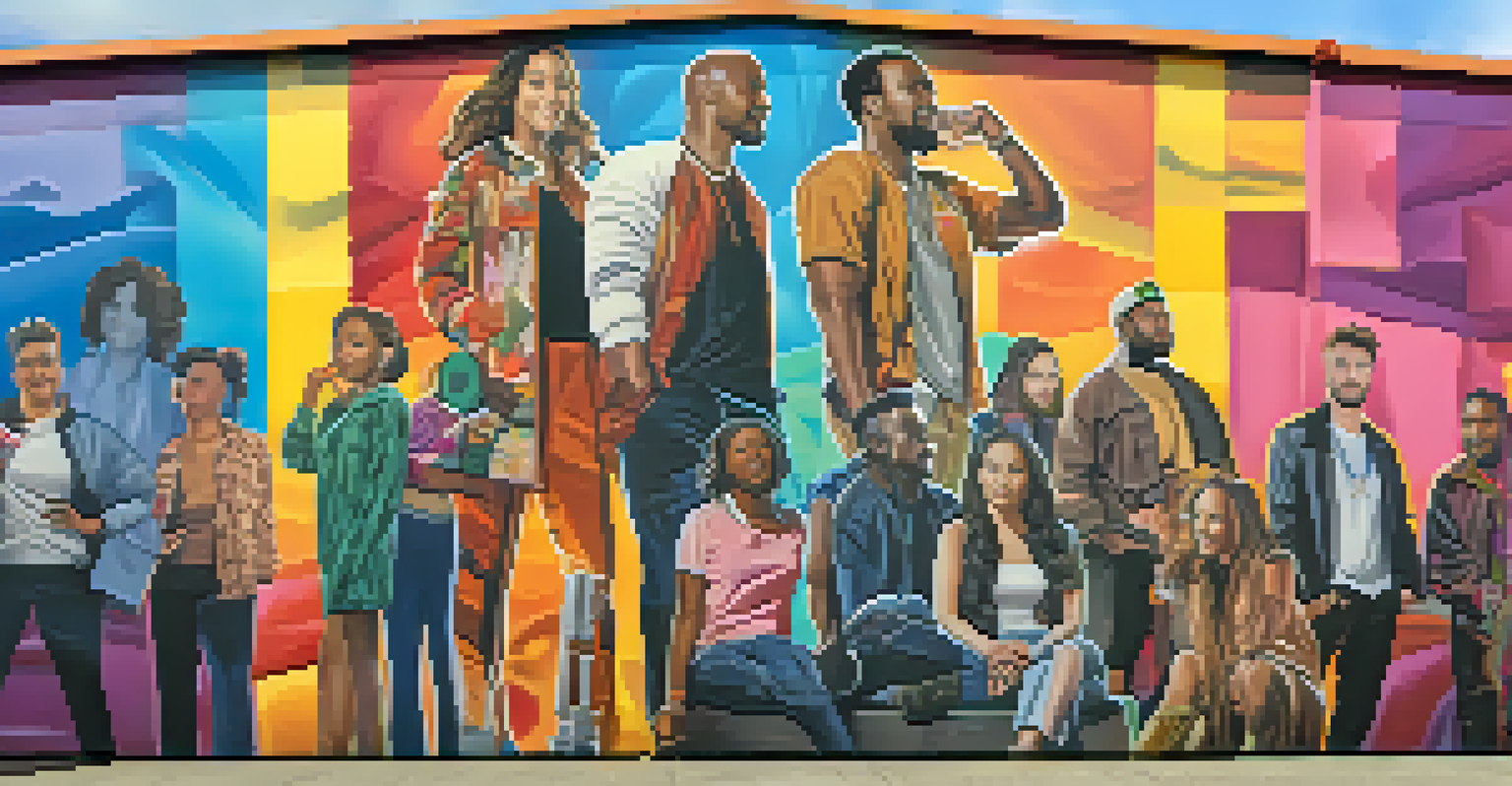The Influence of Hollywood on Public Perception of Mental Health

Hollywood's Role in Mental Health Awareness
Over the years, Hollywood has played a pivotal role in raising awareness about mental health issues. Films and television shows have brought topics like depression, anxiety, and schizophrenia into the mainstream, prompting conversations that many would otherwise avoid. With characters portrayed authentically, audiences begin to see mental health not as a taboo, but as a part of the human experience.
0Mental health is not a destination, but a process. It's about how you drive, not where you're going.
For instance, movies such as 'A Beautiful Mind' and 'Silver Linings Playbook' have shed light on the complexities of mental illness. By humanizing these experiences, they encourage empathy and understanding from viewers who may not have encountered such issues in their own lives. This shift in perception is crucial for reducing stigma and fostering acceptance in society.
However, while Hollywood has made strides, it's essential to recognize that not all portrayals are accurate or responsible. Some films perpetuate stereotypes or present exaggerated portrayals of mental illness, which can mislead the public. Thus, a balanced representation is vital for cultivating an informed perspective on mental health.
The Power of Storytelling in Film and TV
Storytelling is at the heart of every great film or show, and when it comes to mental health, it can be a powerful tool for change. By weaving narratives that include mental health challenges, filmmakers can evoke empathy and provoke thought among audiences. This emotional connection often leads to a deeper understanding of the struggles individuals face.

Take, for example, the character of Bojack Horseman from the animated series of the same name. Through its raw and often painful storytelling, the show explores themes of depression, addiction, and identity. Viewers resonate with Bojack's journey, prompting discussions about mental health in a way that feels relatable and grounded.
Hollywood Boosts Mental Health Talk
Films and shows have normalized discussions about mental health, helping to reduce stigma and promote understanding.
This kind of storytelling not only entertains but also educates, breaking down barriers that have historically made conversations about mental health difficult. By presenting these topics in a digestible format, Hollywood helps to demystify mental illness and encourages audiences to engage with their own mental well-being.
The Influence of Celebrity Advocacy
Celebrities wield significant influence over public perception, and many have used their platforms to advocate for mental health. Figures like Dwayne 'The Rock' Johnson and Selena Gomez have openly discussed their struggles, helping to normalize conversations around mental health. Their candidness resonates with fans and encourages others to seek help and share their experiences.
0The greatest weapon against stress is our ability to choose one thought over another.
This advocacy can lead to a ripple effect, prompting fans to educate themselves and support mental health initiatives. When celebrities share their personal stories, it inspires individuals to confront their own challenges and feel less isolated. The visibility of such discussions can make a substantial difference in how society views mental health.
Moreover, celebrity endorsements of mental health organizations can amplify their message and reach wider audiences. Campaigns led by well-known figures often garner more attention and funding, which can ultimately benefit those in need of support. Thus, the intersection of celebrity culture and mental health advocacy plays a critical role in shaping public attitudes.
The Impact of Social Media and Streaming Services
In today's digital age, social media and streaming platforms have revolutionized how we consume content, including narratives surrounding mental health. Shows available on platforms like Netflix can reach global audiences, allowing diverse stories to be told and shared. This accessibility opens the door for greater representation of mental health issues across different cultures and experiences.
Social media also provides a space for dialogue, where fans can discuss their thoughts on mental health portrayals in films and shows. This engagement can help to further break down stigma, as people share their own stories and support one another. Hashtags and campaigns on platforms like Twitter and Instagram can even lead to movements that promote mental health awareness.
Celebrities Advocate for Awareness
Celebrities sharing their mental health struggles inspire fans to engage in conversations and seek help.
However, it's essential to approach social media with caution, as it can also perpetuate harmful stereotypes or provide unrealistic portrayals of mental health. Balancing the positive aspects of social media with its potential downsides is crucial in ensuring that the conversations around mental health remain constructive and informed.
Misrepresentations in Film and Their Consequences
While many films contribute positively to the conversation around mental health, some portrayals can be misleading or harmful. Stereotypical depictions, such as the 'crazy' villain or the overly dramatic portrayal of mental illness, can reinforce stigma and misunderstandings. Such representations can distort public perception, making it harder for individuals to seek help or feel validated in their experiences.
For example, horror films often depict characters with mental health issues as violent or dangerous, feeding into societal fears and misconceptions. This not only misrepresents the reality for many individuals living with mental illness but can also lead to discrimination and exclusion in everyday life. It's vital for filmmakers to approach mental health with sensitivity and accuracy.
As viewers, we must remain critical of the media we consume and advocate for more authentic storytelling. Engaging with content that portrays mental health responsibly can lead to more informed conversations and promote a kinder understanding of these issues. Awareness is key in ensuring that harmful stereotypes are challenged and reshaped.
The Role of Education and Dialogue
Education plays a crucial role in shaping how we understand mental health, both in and out of Hollywood. As films and shows spark discussions, it's essential to pair entertainment with informed dialogue. Schools, communities, and mental health organizations can collaborate to provide resources and support for individuals seeking to understand these topics better.
Workshops, panels, and community events can facilitate open conversations about mental health, helping to dispel myths and share accurate information. By fostering an environment where individuals feel safe discussing their mental health, society can create a more supportive atmosphere. This is particularly important for younger generations who are increasingly influenced by media portrayals.
Social Media Shapes Mental Health Views
While social media can foster dialogue on mental health, it also requires critical engagement to avoid harmful stereotypes.
Additionally, mental health education can empower individuals to recognize early signs of mental health issues in themselves and others. Encouraging proactive conversations can lead to better outcomes and reduce the burden of mental health challenges. Together, education and media can work hand in hand to promote understanding and compassion.
The Future of Mental Health Portrayals in Hollywood
As we look to the future, the landscape of mental health portrayals in Hollywood is evolving. With increased awareness and advocacy, filmmakers are beginning to prioritize authentic representation in their storytelling. This shift not only reflects changing societal attitudes but also the demand for more nuanced and accurate portrayals of mental health.
New voices are emerging in the industry, including writers and directors who bring personal experiences to the table. This diversity in storytelling can lead to richer narratives that resonate with a broader audience. As more creators share their journeys, we can expect to see a more varied and realistic depiction of mental health in films and shows.

Ultimately, the hope is that Hollywood will continue to play a constructive role in shaping public perception of mental health. By focusing on empathy, understanding, and education, the entertainment industry can help foster a culture that values mental wellness and encourages open dialogue. This positive trajectory can lead to a more compassionate society for everyone.